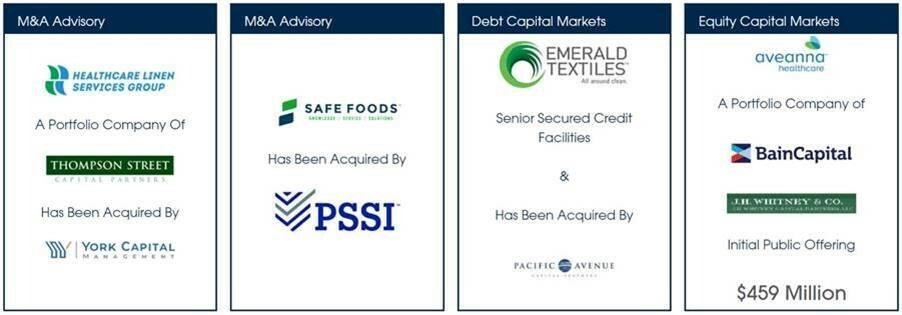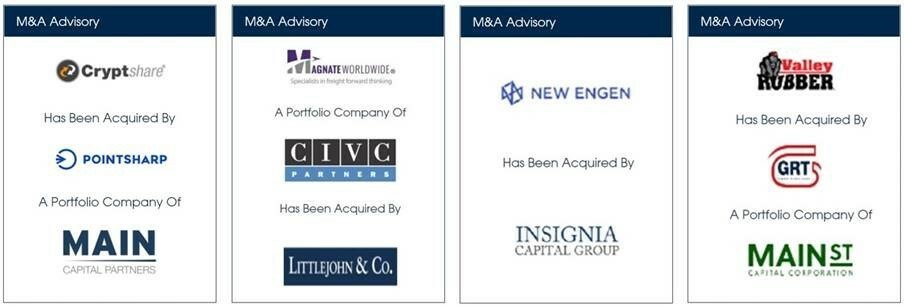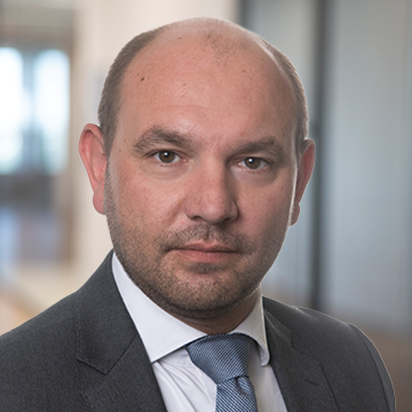TRENDS IN HEALTHCARE SERVICES
Financial sponsors continue to show significant interest in critical outsourced services supporting the U.S. healthcare system. In particular the healthcare linen management space has received considerable attention, given the dynamics surrounding the business model. Long-term contracts, focus on quality and reliability of service, and insulation from reimbursement risk provide favorable dynamics that have attracted private equity investment. As hospitals continue to consolidate, outsourced providers have been following suit in order to support their customers’ larger footprints.
Outsourced services should continue to attract financial sponsors as the U.S. faces an economic slowdown. Poised to maintain steady demand from their customers, despite the economic environment, healthcare outsourced service should continue to be an attractive sector during economic uncertainty even as other nonessential services face pressure from a budgetary standpoint.
The Physician Practice Management sector has also seen continued deal activity, as retiring doctors partner with sponsors and sponsor-backed platforms to transition the ownership of their practices instead of selling to the next generation of practitioners, many of whom appear less interested than their predecessors in owning and running the businesses.
New home-based technologies and the relatively cost effective nature of home health services may accelerate the pace of M&A transactions later in the year, and roll-ups of smaller hospice providers at attractive valuations could gain traction.
The first quarter featured large sponsor-backed acquisitions in the value-based care (VBC) space, which incentivizes industry payers and by extension contracted providers to realize cost savings while serving high-spend patient populations. Perhaps as a result, VBC companies that invest in early stage intervention are increasingly attractive to sponsors.
These factors are predominantly affecting U.S. companies, although healthcare services consolidation is occurring in Europe as well, despite their various national provider systems, along with highly selective cross-border PE deal flow.
U.S. & EUROPE PE DEAL ACTIVITY
Although Q1 2022 estimated total deal volume and total deal value were both higher than in Q1 2021 (for all PE investments, take-privates, sponsor-to-sponsor trades, and exits via public markets), U.S.-based private equity activity transitioned from last year’s record levels into an uneasy first quarter that featured prolonged pauses in deal flow. Q1 M&A fell year-on-year for U.S.-based PE firms, in terms of both total deal value and total deal volume. This was in large part due to macro factors.
Russia’s war in Ukraine disrupted supply chains and exacerbated pre-existing inflationary pressure, while the Federal Reserve’s plan to continue hiking U.S. interest rates is poised to increase borrowing costs throughout the year. Bank financing for leveraged buyouts dwindled in March, and quite a few sponsors have pursued private debt facilities instead of traditional syndicated loans.
In Europe, estimated PE total deal value and total deal volume both hit records last quarter on peak levels of unspent capital, easy access to debt, and lower multiples. However, Q1 PE fundraising, exit activity, and M&A all moderated substantially year-on-year. As quantitative easing gives way to quantitative tightening, and the potential for recession grows, Europe-based sponsors may see greater opportunity for take-private transactions.
Globally, technology sector deals remain attractive, for example in the Healthcare IT space, with sponsors eager to find high-growth-potential companies that are facing temporarily lower valuations. The energy sector also has come into focus for PE – both oil & gas companies and firms active in renewables – as the war has pushed up commodity prices, threatened their supply, and enhanced the appeal of viable alternatives to fossil fuels.
On both sides of the Atlantic, headwinds to PE fundraising, exits, and M&A may lead to limited partners receiving a much greater amount of capital requests from general partners than LPs can fund in the near-term. Some small- and middle-market PE firms might seek to meet their capital raising needs through co-investments and accessing retail channels.
TRANSACTION OVERVIEW
- Stephens Inc. served as joint financial advisor to Healthcare Linen Services Group.
- On April 6, 2022, Healthcare Linen Services Group (“HLSG”), a leading provider of healthcare laundry services in the Midwest and Central United States, announced a strategic growth investment from York Capital Management’s private equity group (“York Private Equity”).
- Healthcare Linen Services Group operates 11 state-of-the-art processing plants across four premier regional brands that manage more than 185 million pounds of healthcare linen on an annual basis for over 500 customers in 12 states.
SELECT HEALTHCARE SERVICES/SPONSOR TRANSACTIONS

SELECT ADDITIONAL SPONSOR-RELATED TRANSACTIONS

About the Experts






- This material has been prepared solely for informative purposes as of its stated date and is not a solicitation, or an offer, to buy or sell any security. It does not purport to be a complete description of the securities, markets or developments referred to in the material. Information included in the material was obtained from sources which we consider reliable, but we have not independently verified such information and do not guarantee that it is accurate or complete. No subsequent publication or distribution of this material shall mean or imply that any such information or opinion remains current at any time after the stated date of the material. We do not undertake to advise you of any changes in any such information or opinion. Additional information is available upon request. To the extent that data referenced in the material is derived from third party data sources or data providers (collectively “Data Providers”), please note that Data Providers do not guarantee the accuracy, adequacy, completeness or availability of any content provided and are not responsible for any errors or omissions, regardless of the cause or for the results obtained from the use of such content. In no event shall the Data Providers or Stephens be liable for any damages, costs, expenses, legal fees or losses in connection with any use of the data included in the material. “Stephens” is the brand name for a family of independent privately held financial services firms, including Stephens Europe Limited, which is authorized and regulated by the Financial Conduct Authority (Registered office 12 Arthur Street, London, EC4R 9AB, Registered number 8817024) and Stephens Inc. which is regulated by the United States Securities and Exchange Commission and the Financial Industry Regulatory Authority (Home Office: 111 Center Street, Little Rock, AR USA, 501-377-2000). Stephens Inc. is a member of NYSE and SIPC. For more information, visit www.stephens.com. © 2022 Stephens This message may contain confidential, proprietary or legally privileged information and is intended for the addressee's use only. If the recipient of this message is not the addressee or a person responsible for delivering the message to the addressee, such recipient is prohibited from reading or using this message in any way. If the reader of this message is not the intended recipient, you are notified that any use, dissemination, distribution, copying or communication of this message is strictly prohibited. If you have received this message in error, please notify the sender immediately by return e-mail and delete the message and attachments. Stephens reserves the right to retain and review all messages processed through Stephens.